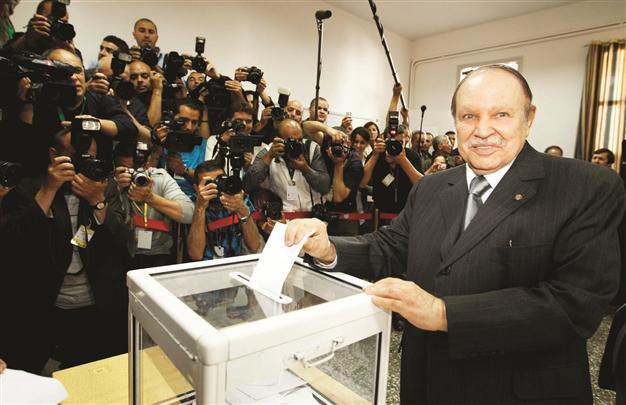Algeria votes in first poll since uprisings
ALGIERS

Algerian President Bouteflika casts his ballot during parliamentary elections at a polling station in Algiers. The election will see 44 parties, 21 of them newly created. REUTERS photo
Algerians voted today in the country’s first polls since the Arab Spring swept the region, with the ruling party, its Islamist allies and a boycott movement all hoping for victory.Social discontent and deadly riots rattled Algeria in January 2011 when revolts were spreading across the region but President Abdelaziz Bouteflika snuffed out the protests with a sprinkling of political reforms and pay rises. The vote will see 44 parties, 21 of them newly created, battle for seats in an enlarged parliament of 462 lawmakers.
The last truly fair elections in 1991 were dominated by a populist Islamist party known as the Islamic Salvation Front, but the military stepped in, canceled the voting and banned the party, prompting more than a decade of civil war that killed an estimated 200,000.
Low turnout expected
Bouteflika’s National Liberation Front (FLN), once the only party, could win the most votes, but it is expected to seek alliances to govern. The FLN, which has 136 seats in the outgoing assembly, currently is in a coalition with the National Rally for Democracy of Prime Minister Ahmed Ouyahia and the Movement of Society for Peace (MSP), the main legal Islamist party.
“I am talking to the youth, who need to take over because my generation has served its time,” Bouteflika, 75, said on May 8. But ever deeper voter disaffection ahead of an election that failed to produce new faces could prompt a huge chunk of the 21-million electorate to shun polling stations. Diplomats predict as few as 35 percent of electorates will vote.
The authorities had hoped a big turnout would give them fresh legitimacy. Meanwhile, the EU mission which will monitor polls will not be given access to the national voters registry, a government official said on May 9. The national roll contains “personal and confidential information whose release is banned under Algerian law,” an official said. Observers will only be granted access to registries at the regional level.
















